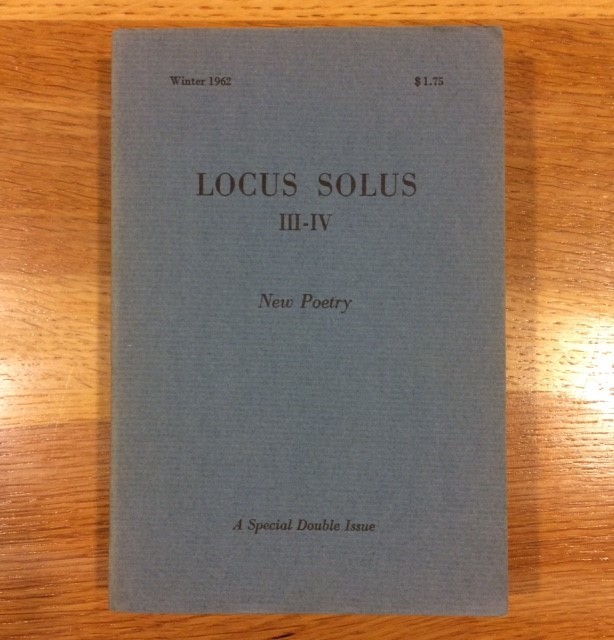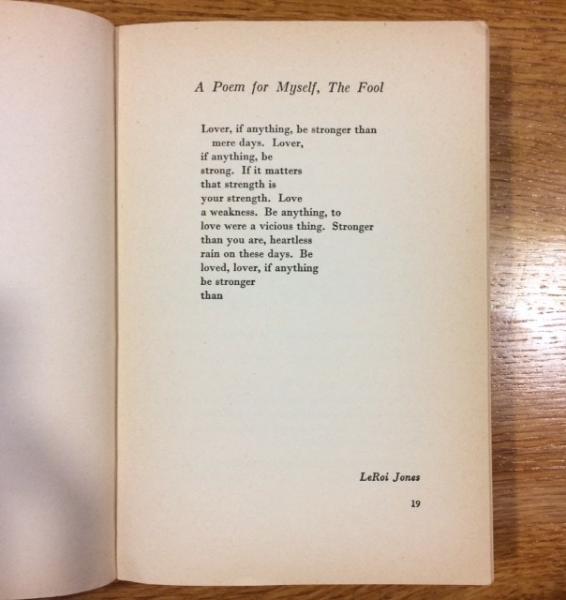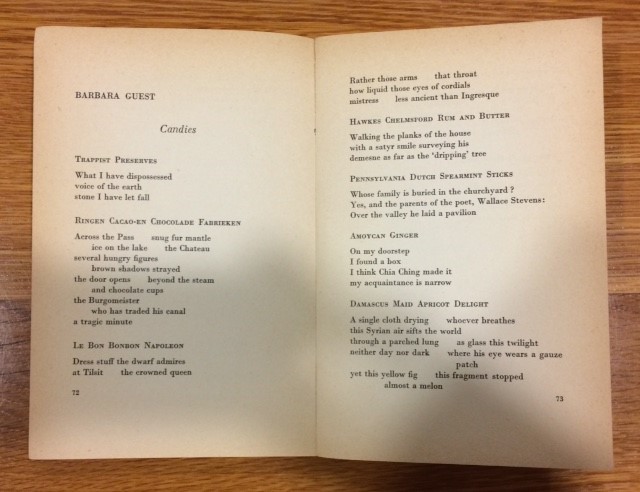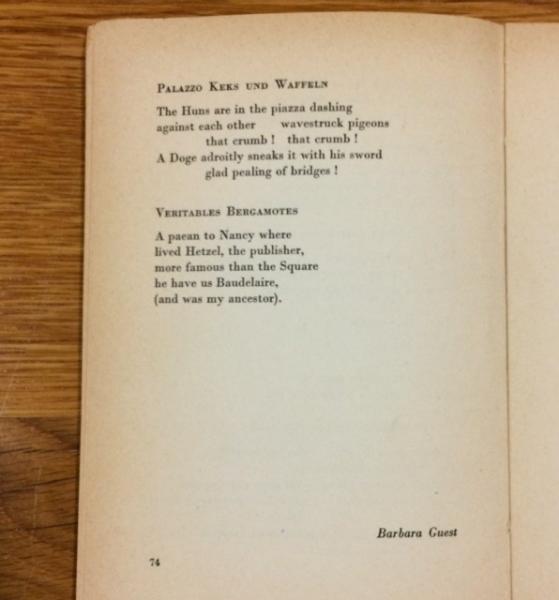Locus Solus

Now to look at Locus Solus, a magazine of poetry and prose edited by John Ashbery, Kenneth Koch, and James Schuyler from 1961–’62, and published by Harry Mathews in Lans-en-Vercors, France. All five issues of the publication are part of The Little Magazine Collection at DU.
To me, the most compelling issue of Locus Solus is “New Poetry,” a double issue (III–IV) edited by John Ashbery, published in Winter 1962. Within New Poetry one finds poetry by (among many others) Ashbery, Joseph Ceravolo, Diane di Prima, Barbara Guest, LeRoi Jones (Amiri Baraka), Frank O’Hara, and James Schuyler — writing crucial to the body of work that evolved from many of the aforementioned poets. For example, Schuyler’s “December” appears in the issue, as does Ceravolo’s “Water: How Weather Feels the Cotton Hotels,” Ashbery’s “The New Realism,” and a mindbendingly terrific LeRoi Jones (Amiri Baraka) poem: “A Poem for Myself, The Fool.”[1]
 At the time New Poetry was published, Jones (Baraka) had recently published Preface to a Twenty Volume Suicide Note; Jones (Baraka) and di Prima had recently been arrested by the FBI on obscenity charges related to The Floating Bear; the poems O’Hara was writing would soon appear in Lunch Poems; Guest had just published Poems: The Location of Things, Archaics, The Open Skies (Doubleday, 1962), and Ashbery’s The Tennis Court Oath had recently been published by Wesleyan University Press.
At the time New Poetry was published, Jones (Baraka) had recently published Preface to a Twenty Volume Suicide Note; Jones (Baraka) and di Prima had recently been arrested by the FBI on obscenity charges related to The Floating Bear; the poems O’Hara was writing would soon appear in Lunch Poems; Guest had just published Poems: The Location of Things, Archaics, The Open Skies (Doubleday, 1962), and Ashbery’s The Tennis Court Oath had recently been published by Wesleyan University Press.
By the time the first issue of Locus Solus made its way into the world, Donald Allen’s The New American Poetry 1945–1960 had been around for over a year. In Allen’s anthology is the poetry of Ashbery, Guest, Jones (Baraka), Koch, O’Hara, and Schuyler. Of the forty-five contributors to the anthology, there are only four women whose poetry appears: Helen Adam, Madeline Gleason, Guest, and Denise Levertov. Notable is the appearance of one of Guest’s great poems, “Parachutes, My Love, Could Carry Us Higher.” Take time here to hear Guest reading the poem at the Recording Laboratory at the Library of Congress in June 1960, and read the poem in its entirety below.
Parachutes, My Love, Could Carry Us Higher
I just said I didn’t know
And now you are holding me
In your arms,
How kind.
Parachutes, my love, could carry us higher.
Yet around the net I am floating
Pink and pale blue fish are caught in it,
They are beautiful,
But they are not good for eating.
Parachutes, my love, could carry us higher
Than this mid-air in which we tremble,
Having exercised our arms in swimming,
Now the suspension, you say,
Is exquisite. I do not know.
There is coral below the surface,
There is sand, and berries
Like pomegranates grow.
This wide net, I am treading water
Near it, bubbles are rising and salt
Drying on my lashes, yet I am no nearer
Air than water. I am closer to you
Than land and I am in a stranger ocean
Than I wished.[2]
In the first issue of Locus Solus, five of Guest’s poems range across thirteen pages; in the Ashbery-edited double issue are two of Guest’s poems and a collaboration with the Turkish poet Sa’di Koylan; and in the fifth issue of the magazine is Guest’s “Candies.”[3]


While Guest was very much included in Locus Solus, the sentiments of the magazine’s editors are telling. In 1959, Schuyler sent Ashbery a letter secretly conveying Koch’s “belief that no one on the New York poetry scene had much to offer their new literary magazine … except for O’Hara, Schuyler, Ashbery, and himself.”[4] Schuyler later wrote to Guest in 1971 — not long after she was left out of Ron Padgett and David Shapiro’s An Anthology of New York Poets, in which Ashbery, Koch, Mathews, and Schuyler were included — and said, “They do not realize that the Founders of the NY school […] are not a trefoil, but a star, a five-pointed star, at the very least.”[5]
What are the excuses for Guest’s exclusion from the Padgett and Shapiro anthology? (I’m sure there are many, and I don’t have time for them.) Rachel Blau DuPlessis writes unequivocally:
Reception and dissemination are never neutral phenomena, and it is often at this point that the familiar bumbling occurs (“honey, I lost women’s writing”). […] No matter how this is parsed, this is a shocking erasure. It would be interesting to examine the gestures of neglect, with their personal ties, mistakes, rejections, many-sided stories, and later apologies or sorrows. We don’t know whether the exclusion changed Guest, for example, nor what debates, quarrels or ennuis, if any, it marked.”[6]
Thinking on exclusion and its role in Guest’s far-too-late acknowledgment by poetry, I turn to her essay “The Shadow of Surrealism,” wherein she describes writing after the movement: “One could never again look at poetry as a locked kingdom. Poetry extended vertically, as well as horizontally, never did it lie motionless within a linear structure.”[7]
From my perspective, poetry remained a kind of locked kingdom for Guest, a core member of the New York School, until the ’90s. Sun & Moon Press published Guest’s Selected Poems in 1995; she was awarded the Robert Frost Medal of the Poetry Society of America in 1999; and Wesleyan University Press published The Collected Poems of Barbara Guest in late 2008, two years after her death. (It’s also worth noting that Guest selected Pam Rehm’s To Give It Up, which was published by Sun & Moon Press, for the 1994 National Poetry Series.)
In a 1995 radio interview with Charles Bernstein, the transcript of which can be read here at Jacket, Guest thinks through the singularity she navigated throughout her life: “the male poets of my generation were the ones with whom I identified because we were involved in the same attitude toward poetry. […] In that sense, I feel very lonely. It wasn’t until newer generations, younger women came along with whom I could identify, as they could identify with me. Among the New York poets, there were very few women.”[8]
1. LeRoi Jones (Amiri Baraka), “A Poem for Myself, The Fool,” Locus Solus, nos. 3-4 (Winter 1962): 29.
2. Barbara Guest, “Parachutes, My Love, Could Carry Us Higher,” The New American Poetry 1945–1960, ed. Donald Allen. (New York: Grove Press, 1960), 216.
3. Barbara Guest, “Candies,” Locus Solus, nos. 3–4 (Winter 1962): 72–74.
4. Timothy Gray, “Fictions Dressed Like Water: Aqueous Imagery in the Poetry of Barbara Guest,” Jacket, no. 28 (October 2005).
5. Sara Lundquist, “The Fifth Point of a Star: Barbara Guest and the New York “School” of Poets,” Women’s Studies, 30:1 (2001): 11.
6. Rachel Blau DuPlessis, “Selections from The gendered marvelous: Barbara Guest, surrealism, and feminist reception,” How2 1, no. 1 (March 1999).
7. Barbara Guest, “The lost speech: The shadow of surrealism,” Women’s Studies 30, no. 1 (2001): 8.
8. Barbara Guest, interview by Charles Bernstein, LINEbreak, Public Radio Satellite System, 1995.
The Little Magazine in America Collection at University of Denver Libraries